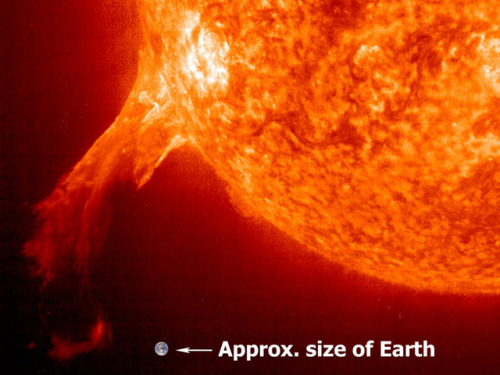The Earliest Mammals Were Night Creatures Which Only Emerged From The Cover Of Darkness After The Demise

The earliest mammals were night creatures which only emerged from the cover of darkness after the demise of the daytime-dominating dinosaurs, according to new research.
This would explain why relatively few mammals follow a daytime-active – or “diurnal”– lifestyle today, and why most that do still have eyes and ears more suitable for living by night.
Continue Reading.
More Posts from Knowledgeiskeyuk and Others
It takes the American beaver 24 hours to learn to swim after being born. Learn more about beavers and how they shape the world around them.

It’s #NationalBirdDay! The Hummingbird is the smallest bird in the world, weighing only a few grams. It is also the only bird that can hover, flapping its wings 55 times per second to effectively remain stationary in the air as it sips the nectar of plants and flowers.

Jeff Bezos: “We Have to Go to Space to Save Earth”

An Erupting Solar Prominence from SOHO
Credit: SOHO-EIT Consortium, ESA, NASA

What Jobs Will the Robots Take?
It is an invisible force that goes by many names. Computerization. Automation. Artificial intelligence. Technology. Innovation. And, everyone’s favorite, ROBOTS.
Whatever name you prefer, some form of it has been stoking progress and killing jobs—from seamstresses to paralegals—for centuries. But this time is different: Nearly half of American jobs today could be automated in “a decade or two," according to a new paper by Carl Benedikt Frey and Michael A. Osborne, discussed recently in The Economist. The question is: Which half?
Another way of posing the same question is: Where do machines work better than people? Tractors are more powerful than farmers. Robotic arms are stronger and more tireless than assembly-line workers. But in the past 30 years, software and robots have thrived at replacing a particular kind of occupation: the average-wage, middle-skill, routine-heavy worker, especially in manufacturing and office admin.
Read more. [Image: Reuters]





AeroMobil, 2018. The latest version of AeroMobil’s flying car has been presented at the Frankfurt Motor Show with first deliveries promised for 2020. On the ground, it is powered by an electric front wheel drive system which gives a range of 700 km, after a three minute conversion, the AeroMobil is ready for flight where it is powered by a turbocharged 2.0-liter four-cylinder boxer engine
NASA Hubble image of Barred SPiral Galaxy NGC 1300

Barred Spiral Galaxy NGC 1300
Credit: Hubble Heritage Team, ESA, NASA

A new study from Northwestern University suggests a little stress can actually have a positive effect on cellular health.
As humans grow older, their cellular machinery responsible for carrying out quality control on the protein-folding process begins to fail. The damaged proteins that are produced as a result are responsible for conditions like Parkinson’s disease, Alzheimer’s disease, and amyotrophic lateral sclerosis. Read more here.

Stephen Hawking fears it may only be a matter of time before humanity is forced to flee Earth in search of a new home. The famed theoretical physicist has previously said that he thinks humankind’s survival will rely on our ability to become a multi-planetary species. Hawking reiterated — and in fact emphasized — the point in a recent interview with WIRED in which he stated that humanity has reached “the point of no return.” Read more here.
-
 pangolin-404 liked this · 4 years ago
pangolin-404 liked this · 4 years ago -
 gormasabzi liked this · 4 years ago
gormasabzi liked this · 4 years ago -
 fenrirsbones liked this · 6 years ago
fenrirsbones liked this · 6 years ago -
 vaguehominid liked this · 6 years ago
vaguehominid liked this · 6 years ago -
 jekyllsoo liked this · 6 years ago
jekyllsoo liked this · 6 years ago -
 72sinkingships reblogged this · 6 years ago
72sinkingships reblogged this · 6 years ago -
 72sinkingships liked this · 6 years ago
72sinkingships liked this · 6 years ago -
 foryorme liked this · 6 years ago
foryorme liked this · 6 years ago -
 hikingboots liked this · 6 years ago
hikingboots liked this · 6 years ago -
 snakesarefuckingcute reblogged this · 6 years ago
snakesarefuckingcute reblogged this · 6 years ago -
 snakesarefuckingcute liked this · 6 years ago
snakesarefuckingcute liked this · 6 years ago -
 atelophobic-sunshine-blog liked this · 6 years ago
atelophobic-sunshine-blog liked this · 6 years ago -
 refusetodatemenwhouseporn liked this · 6 years ago
refusetodatemenwhouseporn liked this · 6 years ago -
 inspiredbyattenborough-blog liked this · 6 years ago
inspiredbyattenborough-blog liked this · 6 years ago -
 jude-blackwell liked this · 6 years ago
jude-blackwell liked this · 6 years ago -
 donotpercievethisuser liked this · 6 years ago
donotpercievethisuser liked this · 6 years ago -
 dapperbonobo liked this · 6 years ago
dapperbonobo liked this · 6 years ago -
 casualwanderess liked this · 6 years ago
casualwanderess liked this · 6 years ago -
 the-skylark reblogged this · 7 years ago
the-skylark reblogged this · 7 years ago -
 the-skylark liked this · 7 years ago
the-skylark liked this · 7 years ago -
 inconstantsearchofperfection reblogged this · 7 years ago
inconstantsearchofperfection reblogged this · 7 years ago -
 inconstantsearchofperfection liked this · 7 years ago
inconstantsearchofperfection liked this · 7 years ago -
 boneyardpets reblogged this · 7 years ago
boneyardpets reblogged this · 7 years ago -
 mygrandma-vs-pneumonia liked this · 7 years ago
mygrandma-vs-pneumonia liked this · 7 years ago
"Develop a passion for learning. If you do, you will never cease to grow." Anthony J. D'Angelo. Visit our website at https://knowledgeiskey.co.uk
66 posts